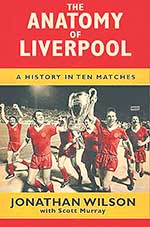 A history in ten matches
A history in ten matches
by Jonathan Wilson with Scott Murray
Orion, £18.99
Reviewed by Rob Hughes
From WSC 325 March 2014
As author of Inverting The Pyramid and The Anatomy Of England, both of which cast a clinical eye over the cultural shifts in football tactics over the past century, Jonathan Wilson is well placed to take the same approach to Liverpool. This insightful, highly readable book attempts to map the evolution of the club through ten specific matches. The idea, he points out, is to choose games that aren’t necessarily the most memorable. Instead they’re the ones that “lie on the faultlines of history, marking the end of one era or the beginning of the next”.
Thus, we have the European Cup second round defeat to Red Star Belgrade in November 1973. Already trailing 2-1 from the first leg, a similar reverse at Anfield becomes the catalyst for a change in Bill Shankly’s philosophy. The realisation hits that traditional English attributes such as pace and power are no longer enough when it comes to playing continental teams with superior technical know-how. Shankly began refining his pass-and-move principles as a direct result of being booted out of Europe that year, resulting in a style that placed greater emphasis on patient build-up play and possession.
It was a method that paid dividends in the 3-1 defeat of Borussia Mönchengladbach in the 1977 final, by which time Bob Paisley was in charge. He is often painted as a more avuncular version of hardman Shankly, but Wilson posits the idea that both men were actually the exact opposite of their public personas. There’s little sentiment with Paisley, even banning Shankly from the Melwood training ground. If Shankly’s brand of football was an extension of his socialist principles, Paisley was far more prosaic. All that mattered was winning football matches.
Elsewhere, Kenny Dalglish’s sudden abdication after the 4-4 draw with Everton in February 1991 is seen as especially pivotal. Entertaining as it may have been to the neutral, the manner of the opposition goals exposed the cracks in a rapidly ageing Liverpool team whose last signing was the spectacularly ordinary Jimmy Carter. Dalglish had simply drained himself of all energy. With no readymade successor in the wings, Wilson makes a valid claim that this game (and the manager’s decision to resign straight after) “was a blow from which Liverpool have arguably never recovered”.
There’s also room, predictably, for the Champions League final in Istanbul. Much has been made of the Liverpool fans’ stirring rendition of You’ll Never Walk Alone as the pep for their side’s improbable second-half comeback. But Wilson instead points at key moments on the field of play as the triggers, not least Sami Hyypia somehow escaping a red card after hauling down Kaká when the Brazilian was clean through to make it 4-0 just after the break.
Above all, The Anatomy Of Liverpool is an engrossing account of a sporting institution forging its identity through the post-war years. Some of the detail is priceless too (Shankly playing his Desert Island Discs show on the coach to the 1965 Cup final; Berti Vogts seeking out Kevin Keegan to buy him a drink in recognition of the Liverpool man giving him the complete runaround). Highly recommended.